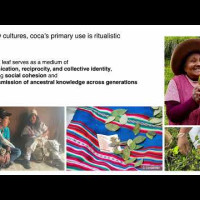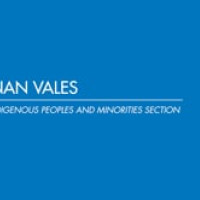WHO Critical Review of Coca Leaf A Comprehensive Overview
Nearly 75 years after the United Nations called for the abolition of coca leaf chewing, a real opportunity to correct this is now underway. The World Health Organization (WHO), at Bolivia’s initiative and supported by Colombia, is currently conducting a ‘critical review’, a procedure designed to reassess if coca is appropiately scheduled in the 1961 UN Single Convention, and its findings may result in changing the coca leaf’s classification. The WHO recommendations will be submitted for approval to the UN Commission on Narcotic Drugs (CND), with voting likely taking place in March 2026. Here you can find all relevant information and documentation related to this review.
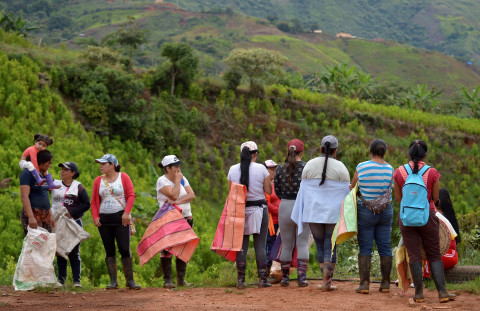
Raul ARBOLEDA / AFP
Recent developments
The review of the coca leaf’s international scheduling is progressing within the WHO and its drugs Expert Committee (ECDD). At the 48th ECDD meeting on 20-22 October 2025 in Geneva the experts will decide on possible scheduling recommendations, which will be presented early December to the CND in Vienna, with a vote scheduled in March 2026. This section presents recent developments and TNI’s latest reflections on the process and its broader implications.
-
Reconsidering Coca Leaf Scheduling: TNI Statement to the WHO-ECDD
Fecha de publicación: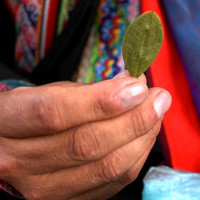
-
Scientific distinctions between coca and cocaine support policy reform Ongoing review of international drug policy should correct long-standing, misguided, and harmful conflation
Fecha de publicación: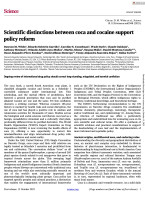
-
Scientific distinctions between coca and cocaine support policy reform
Fecha de publicación: -
Statement by Hernan Vales, chief OHCHR Indigenous Peoples and Minorities sectionWHO - 48th ECDD Information meeting - 20 October 2025 WHO - 48th ECDD Information meeting - 20 October 2025
Fecha de publicación:
Timeline
WHO/ECDD coca leaf review (2025–2026)
- Member State focal points invited to send information via Member State Questionnaire.
- Additional information for consideration can also be sent by all parties.
- Critical review report posted online; written comments accepted by 15 October.
- Expert Committee member biographies posted online for public comment.
— 48th ECDD information meeting
- Public consultation for all parties to submit written statements and oral interventions to ECDD.
- Peer review of critical review reports.
— 48th Expert Committee on Drug Dependence (closed session)
- Committee develops recommendations on the basis of the critical review.
- WHO formally presents 48th ECDD meeting outcomes and recommendations to the 68th CND Reconvened.
- Publication of WHO ECDD Technical Report Series.
- CND may consider voting on the 48th ECDD recommendations.
Coca Chronicles: Monitoring the UN Coca Review
The Washington Office on Latin America (WOLA) and the Transnational Institute (TNI) will be monitoring the coca review process closely and examining key aspects of the debate.
-
Coca Chronicles: Monitoring the UN Coca Review Issue #1: Bolivia Challenges UN Coca Leaf Ban
Fecha de publicación: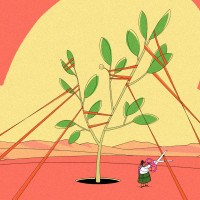
-
Coca Chronicles: Monitoring the UN Coca Review Issue #2: Coca Leaf Progress at the UN Commission on Narcotic Drugs
Fecha de publicación:
-
Coca Chronicles Issue #3 A Conversation on Coca with Wade Davis
Fecha de publicación: -
Conflicted over Coca Issue #4: Andean-Amazonian Indigenous Peoples see promise and peril in lifting coca ban
Fecha de publicación:
-
The UN Coca Leaf Review and Indigenous Peoples’ Rights: Can the WHO Meet the Moment? Coca Chronicles #5
Fecha de publicación:
-
La OMS y el Proyecto Cocaina El estudio de la OMS sobre la coca y la cocaína que el mundo no llegó a conocer
Fecha de publicación:
Publications
-
Righting a historical wrong The UN review of the international status of the coca leaf - Version 2
Fecha de publicación: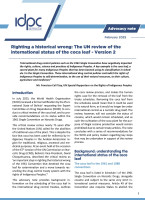
-
¿Qué significa para Centroamérica? Revisión Crítica de la Hoja de Coca
Fecha de publicación: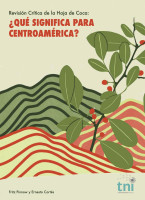
-
Coca Myths
Fecha de publicación: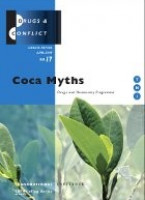
-
Lifting the ban on coca chewing Bolivia’s proposal to amend the 1961 Single Convention
Fecha de publicación: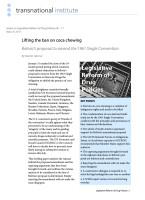
-
Coca Yes, Cocaine No? Legal options for the coca leaf
Fecha de publicación: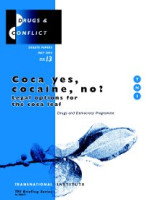
-
Coca, Cocaine and the International Conventions
Fecha de publicación: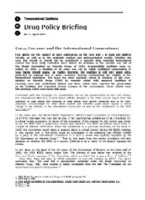
WHO Cocaine Project
-
The WHO cocaine project TNI publishes banned study
Fecha de publicación: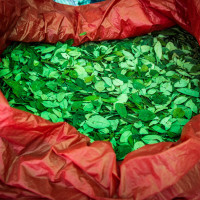
-
WHO: 'Six Horsemen ride out'
Fecha de publicación: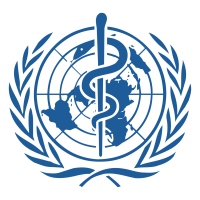
-
Fact Sheet: Coca leaf and the UN Drugs Conventions
Fecha de publicación: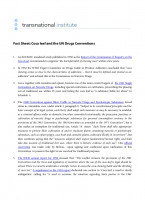
-
Report of the Commission of Enquiry on the Coca Leaf
Fecha de publicación: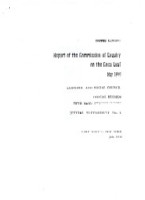
Consultations in Bolivia, Colombia and Peru
During 2024 TNI and its partners in Bolivia, Colombia and Peru, organised consultations on the critical review of coca by the WHO and its potential consequences. A total of 10 meetings were organised, with around 400 participants. The participants consisted of coca farmers, most with native indigenous roots, academics and coca experts, human rights activists and representatives of Indigenous Peoples of the Andean-Amazon region. In the case of Peru several initiatives were taken, by farmers organisations and academics, to call on the government to support the efforts to declassify the coca leaf.
- Consultations in Bolivia about the coca review process, organized with Amigos de la Tierra (ASAT) and the ‘Alianza por la Vida’ (September 2024, in Spanish)
- Dialogue in Mitú (Vaupés, Colombia) about the coca review process with Indigenous Peoples from the Colombian Amazon region, organized with VisoMutop, OHCHR and Senator Julio César Estrada (13-14 January 2025, in Spanish).
- Consultations in Tumaco (Nariño) and Toribío (Cauca) about the coca review process with Indigenous Peoples and people of African descent in Colombia, organized with VisoMutop (October 2024, in Spanish).
- Letter from Ricardo Soberón, former DEVIDA director, to the Peruvian Minister of Foreign Affairs, arguing why Peru should support the Bolivian initiative for a critical review of the coca leaf (August 2024, in Spanish).
- Letter from CONPACCP (National Confederation of Agricultural Producers of the Coca Valleys of Peru) to the Peruvian President and Minister of Foreign Affairs, asking them to support the Bolivian initiative for a critical review of the coca leaf (August 2024, in Spanish).
- Letter from POFEPOPA (Confederation of Peruvian Agricultural Producers of the Monzón Valley) to the Peruvian Minister of Foreign Affairs, expressing their support for the declassification of the coca leaf (August 2024, in Spanish).
- Declaration of the XIX International Congress on the Sacred Coca Leaf, asking for the withdrawal of the coca leaf from Schedule I, 5 August 2024, Pichari, VRAE, Cusco, Peru.
- Peruvian civil society response to the biased report presented to the WHO by the Peruvian government in October 2024, elaborated by a group of Peruvian academics and farmers organisations (December 2024, in Spanish).
Legal status and criminalisation
In the neighbouring countries of Peru and Bolivia, where coca has been part of daily life for centuries, coca use has increased over the last decades. In Argentina in particular coca chewing has a firm place amongst the population of the Northern provinces, and also Chile has coca consuming Indigenous and non-Indigenous populations. In other Latin American and European countries migrants from the Andean region bring their habits of coca use with them when moving across borders and are regularly confronted with criminalisation.
- Coca in Argentina: Resistance to being classified as a “narcotic”, Alejandro Corda, Intercambios Civil Association (Buenos Aires, May 2025).
- The Coca Leaf in Chile: A Review of the Legal Status: Analysis of their legal status based on case studies, Claudia Levine, Lobeliana Foundation (Santiago, Chile, May 2025).
- Video: TESTIMONY: Cocaine and its legal problems in Chile (subtitled in English)
- Coca Leaf in Court: Cultural Rights and the Toxicological Labyrinth, Constanza Sánchez, José Carlos Bouso, Pien Metaal and Roberto Castro, ICEERS (Barcelona, July 2022).
- Migrants and Traditional Use: The Coca Leaf Travels from the Andean Amazon to the European Courts, ICEERS (May 2019).
- A decade of providing legal defence support for coca leaf cases in Spain, Drugs Habits and Social Policy 25(3), Constanza Sánchez and José Carlos Bouso (September 2024).
External links
The UN review of the international status of the coca leaf (IDPC)
Wisdom of the Leaf - Coca Summit (McKenna Academy)
Defending Coca Leaf Traditions in Court (ICEERS)
Minga Koka (Lobeliana)


